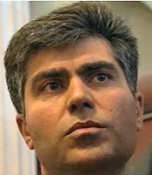
ABOVE: Majid Kakavand
This blog has previously reported on the case of Majid Kakavand, both here and, most recently, here. Kakavand, an Iranian citizen, was provisionally arrested in March 2009 by French authorities at the request of the U.S. Government. The provisional arrest warrant alleged that Kakavand used a company of his in Malaysia to order electronic components from U.S. companies and then transshipped those components to Iran. On April 14, the French court will hold its sixth hearing on the US request for Kakavand’s extradition from France.
There has been almost no coverage of this case in the U.S. press. Most of the English-language press coverage of this case originates from the Government of Iran, which is, needless to say, a less than reliable source on matters such as this. But a recent French-language report from TF1 provides some interesting detail about the upcoming hearing on April 14.
First, the court has now received the reports on the exported items that it requested from French authorities, namely from the DGA, the French agency responsible for developing and procuring items for the French military, and from two bureaus of the Ministry of the Economy. Both agencies have reportedly concluded that the items exported by Kakavand from the United States to Iran (through Malaysia) were not dual-use items. If that is the conclusion of these two reports, it will mean that there is a good chance that the extradition request will be denied by the French court.
Second, Kakavand’s lawyers have now alleged that the U.S. government falsified documents that it presented to the French court in support of the extradition request. In addition, his lawyers claim that they are requesting prosecutors in San Francisco to investigate these allegations of document forgery. The basis for this claim of falsification seems, frankly, not very convincing. The lawyers allege that the U.S. submitted emails that had attachments with dates that did not correspond to the emails.
I suspect that on that basis alone most of my emails might be subject to a claim of falsification, because they often have attachments created before the date of the email. If the allegation is that the documents bore dates after the date of the email to which they were attached, there are also reasonable explanations for that. In particular, the date shown by the operating system for the attachment might reflect the last time it was accessed on a particular computer. Dates on pages of the document might be typographical errors. And, of course, if someone is going to forge documents, it is unlikely that such obvious discrepancies would be permitted in the forged documents. It would be like adding “1982” after the signature of a forged Vermeer.
In all events, even though I think the U.S. claim for jurisdiction to prosecute Kakavand for his activities in Iran and Malaysia is dubious, I don’t buy the notion that the U.S. Government would go so far as to falsify documents to support its request.
 Permalink
Permalink
Copyright © 2010 Clif Burns. All Rights Reserved.
(No republication, syndication or use permitted without my consent.)

 Posted by
Posted by  Category:
Category: 

